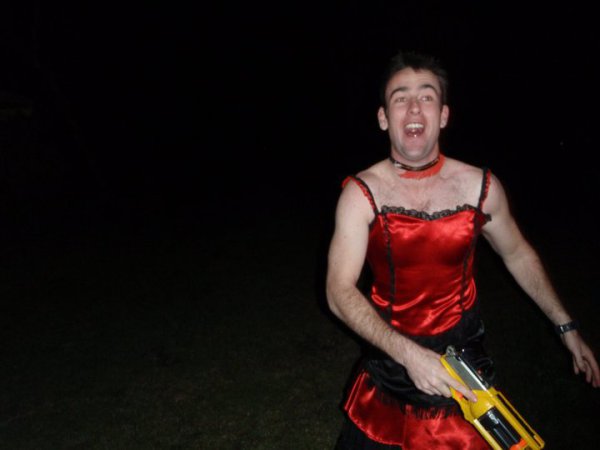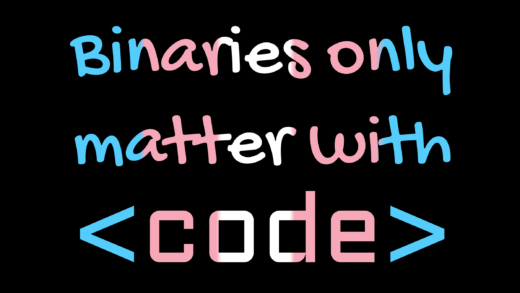I have traditionally given people the benefit of the doubt. When someone is declared a terf (trans-exclusionary radical feminist) and I have doubts I’ll usually take a look at their social media or the evidence for the claims, and then I’ll make a personal judgement call on my own feelings. A lot of the time my conclusion has been “not enough data” or “could have been misread”.
The biggest thing I can think of here that falls into that category was when Joanna Cherry was labelled a terf for saying she didn’t want to see hate messages at a Pride event.
And you know what, I can see her point. I’d be even more able to see her point if the “hate” in that tweet was more than the words “fuck TERFs” on a single sign.
That was enough to put Cherry on my terf radar but not enough to really convince me.
Cherry is also my MP, and I was quite happy to vote for her several times based on her record of opposing the Tories and calling them to account for lunatic decisions and policies. She even went so far as to sue them for closing parliament illegally. These are all reasons why I am happy to have voted for her, and why I am happy she has been my MP.
But I’ve also been following her more closely since that tweet from two years ago. And I’ve written to her on the subject of GRA reforms. And she’s very pro-women’s rights in a way that usually indicates the person is anti-trans rights.
In a response to a letter I sent her about GRA reform, she put a different spin on things than she has elsewhere.
I can assure you that I support the rights of trans people and I am proud of the rights-based protections for trans people which are enshrined in legislation in Scotland. I also believe that all young people who are questioning their gender identity should be able to access appropriate healthcare and support.
The Scottish Government has said that it intends to reform the GRA and has carried out a series of consultations on its proposals to do so. This process is ongoing. GRA reform requires careful consideration of any impact on existing legislation and rights, including the Equality Act 2010 and women’s sex-based rights.
Joanna Cherry, response to letter, 26/06/2020
In one paragraph she supports trans rights, and in the next she says that women’s sex-based rights need to be taken into careful consideration when reforming the GRA. As I have learned, “women’s sex-based rights” is one of those terf checkboxes you need to look out for.
I do understand the position of safe spaces for women. There are many abuse survivors in the world (I am one of them) and having somewhere where they can feel safe is important. So I understand the desire for womyn-only1“womyn” being a term used by terfs to indicate assigned-female-at-birth women spaces for those who need them. But that does exclude women who need safe spaces from those very safe spaces, and that is itself a problem.
The “man in a dress” problem
One of the most transphobic perspectives I see is that of a “man in a dress”. That it’s a trick, a ploy, a scheme to fool you into letting them into your space and violate you. Popular media has perpetuated this view by having a large number of trans people be exactly that.
Ace Ventura: Pet Detective (1994) has a villain who had sex reassignment surgery to steal someone’s identity and get revenge, who is then stripped to reveal their pre-op genitals and the “truth” about their identity.
NCIS Season 1 (2003) has a murderer who “poses” as a pre-op trans woman in order to evade authorities. Much like in Ace Ventura, a character has kissed “her” and is mocked for kissing a man in a dress. NCIS does make up for it somewhat by having a trans character who is not a villain in disguise in Season 2, but even in Season 9, they’re still referencing Tony kissing a transvestite.
This view perpetuated by popular media has legitimately put fear in me about looking like a man in a dress, and I’ve been wearing dresses since 2007. Two years ago I bought a dress for a character I play at LRP and I was so scared about looking like a man in a dress in front of close friends that I spent extra money on luggage space so I could bring an alternate outfit to a private group event. I shouldn’t have been worried, but the thing is that portrayal in public spaces affects how you think. As a society, we need to be more aware of how we portray things and how we address transphobia within our society.

SNP and transphobia
Two weeks ago, Nicola Sturgeon, leader of the SNP put out a message about transphobic behaviour within the party on Twitter which was very pro-trans rights and anti-transphobia within the party.
Last week Cherry was sacked from the SNP frontbench for reasons including her opposition to GRA reform and her anti-transphobia positions in debates and policy.2Source: https://www.theguardian.com/politics/2021/feb/01/joanna-cherry-sacked-snp-frontbench-westminster
Cherry then followed this up with an article published in the New Statesman in which she attempts to explain her position.
The question – do you believe or have you ever believed that women are adult human females? – is one I must answer in the affirmative, but it’s not a response that is popular with some who have the ear of the leadership.
It’s frustrating because advocating for women’s sex-based rights under the Equality Act, expressing concerns about self-identification of gender and opposing curtailment of free speech, are not evidence of transphobia.
Joanna Cherry, The New Statesman: “Joanna Cherry’s Diary: Why I was sacked, coming out as gay in the Aids pandemic, and turmoil in the SNP“, 9th February 2021
I don’t think it takes a genius to see that Cherry first says “trans women aren’t women” then claims that her actions to make that view government policy are not transphobic. I rather think this op-ed piece rather exposes her as a terf rather than actually helping her case.
Terfs in the public eye
Cherry is hardly the first terf to come to the public’s eye. JK Rowling, author of the Harry Potter series, has made headlines all over the world for her views and statements which align quite closely to Cherry’s.
Rowling has also been active on Twitter about her views, but has gone further by writing anti-trans propaganda, and writing a novel (under a nom-de-plume) about a killer who poses as a woman to get into women’s spaces and kill them.
ContraPoints on YouTube has an excellent breakdown on Rowling and her views, which explains it far better than I could.
Both Cherry and Rowling have been seen to support transphobic activists such as Maya Forstater who also makes statements along the lines of “I’m not transphobic, I just don’t believe trans women are women”.
The defences are varied, but usually come down to one of a few points. Either they’re concerned for women’s rights being lost due to pro-trans policies, or they’re concerned about people with penises being in women’s spaces, or they just straight up don’t believe someone can identify as another gender without years of therapy, intrusive questions, and risky surgery.
Taken at face value, these reasons and excuses can seem reasonable, but when investigated, the root of their concerns is fear. Given that a number of the people I am aware of who are pro-trans but also transphobic are survivors of abuse, this is quite understandable to me. Understandable, but not enough. If you’re worried about abusers, tackle the problem of abusers rather than taking it out on trans people.
There is a common cry that pro-trans people are silencing women. This isn’t true. The only ones that say that are those that oppose trans rights and don’t like being called on it.
Where I stand
There has been a lot of internal debate going on in my head about whether I am part of the trans community. I’m not sure I’ve settled on an answer to that question, but I’m leaning towards “yes”. I describe myself as non-binary genderqueer. I’ve felt I have tendencies and qualities usually ascribed to female personas since childhood, yet I don’t think of myself as a woman – but I don’t think of myself as a man either.
I, like many others, have grown up with the internet and the expansion of awareness within that shared communication space to share ideas and feelings. I am not so young as to have been immersed in it since childhood, but it has still allowed me to explore and find a truer idea of who I am.
It is not the case that there is a trans epidemic, or that there are people being converted to trans ideologies because of the internet as some people (Rowling) have stated. Merely that it is easier for people to connect and discover that they are not alone.
Society needs to reject the transphobic ideas of mass media and start being more inclusive of trans people as a whole. Events like Elliot Page coming out are going to become more common, and they’re going to set the groundwork for trans-inclusive mass media and a shift in society’s views. In a generation, the idea that transphobia was even an issue might be something unbelievable – and I hope that is indeed the case.



